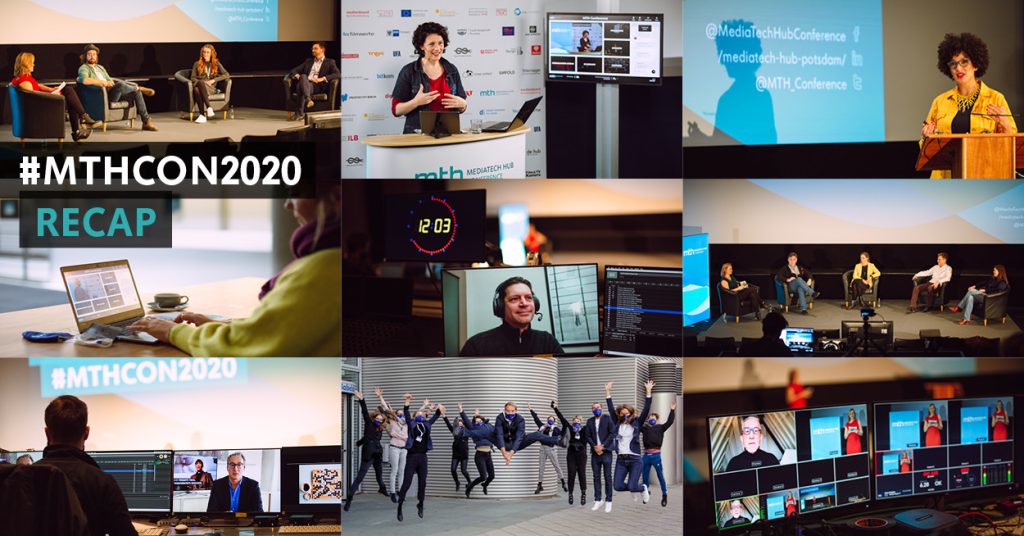What a premiere! For the first time, the MediaTech Hub Conference 2020 took place in a hybrid format – produced live in the Babelsberg studios and accessible via an interactive online platform. After months of preparation, all the work and courage to realise the MediaTech Hub Conference in this year of crisis finally paid off. During the two conference days more than 800 people took part in #mthcon2020 and experienced over 30 hours of programme with more than 75 speakers on three stages via our interactive online platform.
We have learned so much – about MediaTech trends and creative business models, about current challenges and future industry visions.
Here is a little recap of some of our #mthcon2020 highlights
Murat Sönmez from the World Economic Forum and author Kenza Ait Si Abbou as opening speakers:
The two opening keynotes of the MTH Conference took a look behind the curtain of the tech industry: What responsibility do people have in interacting with technology and how can we use media technologies to create a fair and human society? Murat Sönmez, Director of the Centre for the Fourth Industrial Revolution at the World Economic Forum, opened the first day of the conference: “To unleash the potential of the Fourth Industrial Revolution we must shape it in a transparent and inclusive manner. Let’s put our collective minds together and create a future that we can all be proud of!”
The second conference day started with a keynote by Kenza Ait Si Abbou, author and Senior Manager Robotics and AI at Deutsche Telekom, on how artificial intelligence reproduces racism: “Every little click trains machines. If white people get more likes, machines learn that they are more relevant. We have the responsibility to fight this discrimination. Empathy is what distinguishes us from robots and we also need to apply this emotional intelligence online.”
Entertainment Stage – Technology meets creativity:
On the Entertainment Stage of the MTH Conference everything revolved around media technologies for film, television and broadcast. A key issue of the discussions was the impact of the pandemic on the film world and the increasing digitalisation of the industry. According to Marc Schwellenbach, Head of Production at UFA, the pandemic is accelerating developments in the field of smart and virtual production enormously: “Covid-19 acts like a fast forward button. New technologies are adopted much faster and make work flows more efficient in many areas”. The pandemic radically challenges the status quo in the industry but also enriches creative visions, many speakers concluded.
A highlight of the Entertainment Stage was the keynote speech by Annie Chang, Vice President Creative Technologies at Universal Pictures. In her vision for the future of filmmaking, she urged: “Let’s really become digital native in everything we do – from the call sheets, the filming of it & the visual effects. If it’s digital, we can use technology to solve actual problems for our production.” In addition to efficiency, topics such as inclusion and sustainability in the film industry also played an important role. Zena Harris from the sustainability consultancy Green Spark Group pointed out: “It’s not only about recycling but about rethinking how production is managed and establishing clear rules.”
Industry Stage – The potential of VR and AI:
The Industry Stage of the MediaTech Hub Conference shed light on the potential of media technologies in the fields of mobility, health, events and Industry 4.0, focusing in particular on the possibilities of virtual reality and artificial intelligence. For Michel Reilhac, VR Competition Curator for the Venice Biennale International Film Festival, the future lies in “phygital” event formats: “VR platforms offer a fascinating alternative to real life, but the real impact lies in hybrid formats. The physical anchors the virtual.” In the E-health track, health experts discussed how immersive technologies can support the treatment of patients and the fight against pandemics. The essence: In order to be effective, health technologies must be designed patient-centred.
In the track Mobility, Kirsten Hegner from the Digital Hub Mobility gave insights into the latest studies on micromobility: “You don’t have to reinvent the wheel to implement micromobility. Look at the specific structure and the public transport in your city and learn from other cities that have done it.” On the Industry Stage one could also experience live use cases: Marius Swoboda from Rolls-Royce, for example, switched live to the VR-Cave in the Berlin factory and demonstrated how the company optimises industrial processes with the help of immersive technologies.
Partner Stage – Mathias Döpfner and Sebastian Turner on the future of ContentTech:
For the first time this year we also had a #mthcon2020 Partner Stage in cooperation with Trafo MediaTech, the University of Potsdam and the University of the Arts Berlin. Here, further programme highlights awaited the participants: Mathias Döpfner, CEO of Axel Springer SE, and Sebastian Turner, publisher of the Berliner Tagesspiegel, talked about the latest developments of content technologies in the media scene. Mathias Döpfner emphasised: “The combination of technical creativity and journalistic creativity are more relevant than ever. A journalist who does not involve the developer in the idea process from the very beginning is no longer a good journalist nowadays”.
Side programme . Workshops, Startup Pitch Arena, Networking Carousel and a digital cinema:
In addition to the programme on the stages, the participants could experience a multifaceted side programme: Workshops provided hands-on knowledge about serial production, metadata, micromobility and digital ecosystems. In the Startup Pitch Arena, innovative MediaTech startups presented their business models and the Networking Carousel encouraged spontaneous networking. In addition, film lovers had the choice between six curated films on show at the digital Cinemalovers Cinema.
On-Demand – All content available until December 9:
Great news for those who missed the two conference days: In order to give even more people the opportunity to dive into our programme this year, our platform will remain open for another four weeks. For only 9,90 Euro you can now buy your On Demand Ticket, giving you access to all #mthcon2020 sessions until December 9! So, the MediaTech Hub Conference 2020 is far from being over!
Are you curious about our production site in Babelsberg and how the live sessions found their way onto the online platform? Take a glance at the #mthcon2020 photo galleries of Day 1 and Day 2.

